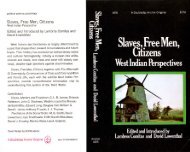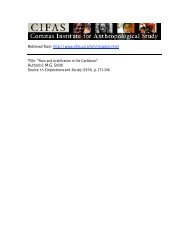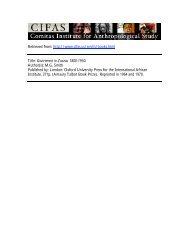You also want an ePaper? Increase the reach of your titles
YUMPU automatically turns print PDFs into web optimized ePapers that Google loves.
<strong>Kano</strong> <strong>Chronicle</strong> 51<br />
accounts of the reigns of the Fulani emirs who followed Alwali make little<br />
reference to the rebellions and revolts they had to deal with.<br />
In short, the <strong>Chronicle</strong> by itself is neither a fully reliable nor a comprehonsive<br />
guide to the history of <strong>Kano</strong> under its Hausa or Fulani chiefs.<br />
P<br />
Fortunately it is now no longer the only source; and we should theret;re"<br />
exploit it with all others available to us, such as the Asl al Wanqariyin, the<br />
Al-ilan bi tarikh <strong>Kano</strong>, <strong>Kano</strong> ta Dabo Cigan:, Alkali Zangi's Taqyid al-Akbar,<br />
and any others, local or 'foreign', which can check, enrich or shed light on<br />
these dark centuries of <strong>Kano</strong> and Hausa history. It would of course be quite"<br />
absurd to treat any single document as the sole and authentic account of<br />
French or British history before or after the Roman witlldrawal. Yet if so,<br />
why then, and for how much longer, will we discuss the <strong>Chronicle</strong> as though<br />
it is the sole document or source of information on <strong>Kano</strong>'s history before<br />
the Fulani conquest?<br />
The <strong>Chronicle</strong> does to an extraordinary degree document the historical<br />
derivation of various hereditary offices (sarautu) which together provided<br />
the administrative framework of the chiefdom, distinguishing those of royal<br />
rank from others of clerical, noble, commoner, slave or eunuch rank, and<br />
distinguishing women's titles from others. It documents their emergence,<br />
status and roles, noting the various lapsed offices that formed part of the<br />
Hausa officialdom in Alwali's day and in previous reigns. The <strong>Chronicle</strong><br />
by no means. supplies a comprehensive account of the Hausa polity at <strong>Kano</strong>.<br />
As noted, it says very little about Baba Zaki's fundamental reorganization of<br />
the officialdom and its communication structure, though fortunately Mallam<br />
Adamu records this, and in 1959 details could still be recovered from oral<br />
accounts.<br />
Alone, the <strong>Chronicle</strong> can neither fully and accurately report the political<br />
history of Hausa <strong>Kano</strong> nor its political ethnography at Alwali's day. However,<br />
for any understanding of the development and vicissitudes of the<br />
Hausa chiefdom or its organization on the eve of the Fulani jihand, it is not<br />
merely indispensable but irreplaceable. Without it, allowing for all the other<br />
available documents and sources of information, we should not have sufficient<br />
data to check externally the validity of any reconstruction we might<br />
make of the Hausa polity at <strong>Kano</strong> on the eve of its conquest and replacement.<br />
Neither would we be able to trace the processes of its evolution as a<br />
formation developed over several centuries to resolve struggles between an<br />
aggressive patrimonial chiefship and the oligarchies of competing aristocrats<br />
and slaves on which its rule was based, and with which the chiefship was<br />
closely associated. In the absence of a successor-state to <strong>Kano</strong>, the <strong>Chronicle</strong><br />
still provides the finest and fullest independent check on the validity of<br />
historical reconstruction derived from inquiries within the contemporary<br />
state that scholars could ever hope for or expect. Moreover, as mentioned<br />
above, the <strong>Chronicle</strong> nicely documents the rebellions, revolts, civil wars and





